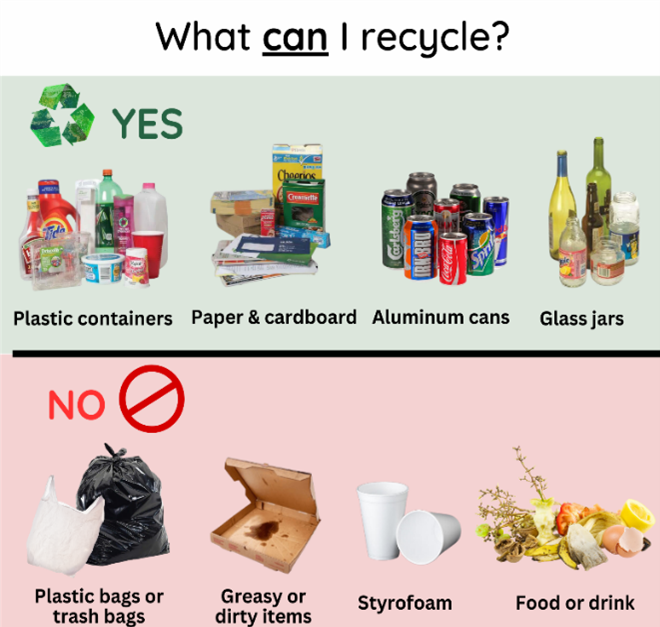
October 2023: Recycling 101: The Dos and Don’ts of Recycling
Recycling might just be one of the easiest things that we can do for the environment . . . right? When people think of being more sustainable, they will often go straight to recycling as an answer for being more eco-friendly. However, recycling might not be as easy as you think if you don’t take the time to know the proper rules. Some well-intentioned citizens can find themselves “wish-cycling,” which includes trying to recycle items that are not actually recyclables. While this doesn’t sound inherently harmful, wish-cycling damages the recycling process by wasting time and resources for facilities that have to remove non-recyclable items from the system. To prevent wish-cycling and help make the recycling process more efficient, here are some big DOs and DON’Ts of Recycling 101.
DO Reduce Waste Where You Can
Before you start throwing your items in the recycling bin, you should first consider reducing and reusing where you can. Remember the 3 R’s- reduce, reuse, recycle. This means that you should reduce and reuse first. For example, maybe you want to cut down on your plastic water bottle consumption or reuse your plastic containers for a new purpose before throwing all your plastic in the bin. It’s always important to consider the other 2 R’s – reduce, reuse – before you come to the third R: recycle!

DON’T Throw in Plastic Bags or Trash Bags
Plastic bags are one of the biggest “NO’s” of recycling and one of the biggest contaminants seen at recycling facilities. The material of plastic bags makes it unable to be processed in the same way as other plastic bottles or containers. Plastic bags cause equipment jams, which create further delays and inefficiencies in the recycling process. To help speed up the process and protect our environment, make sure you are not throwing plastic bags or trash bags in your curbside recycling. If you want to recycle your plastic bags, check out facilities that have specific recycling programs for plastic bags.
DO Use Paper or Reusable Bags
The good news is that there are plenty of sustainable alternatives to plastic bags! If you’re looking for something to carry your recyclables in, paper bags are a great option. Paper bags can be recycled, so you can throw recyclables into your bag for a convenient trip to the recycling bin. Using reusable bags are also a great way to cut back on plastic waste and to reduce the amount of plastic you are using. Use a reusable bag to avoid the headache of plastic bags altogether. Not only will recycling facilities thank you, but the planet will, too!
DON’T Throw in Greasy or Dirty Recyclables
Another big “NO” of recycling is throwing in items that are dirty or greasy. In general, pizza boxes can’t be recycled because of all the grease that soaks into the cardboard. The food debris on your recyclables can be problematic. Dirty materials, like greasy pizza boxes, may contaminate clean recyclables and create poor-quality products. Rather than trying to recycle that greasy pizza box or sticky cup, just throw it out to make recycling more efficient.
DO Wash Out Your Recyclables
You can avoid sending contaminated materials to the facility by cleaning out your recyclables. Taking the extra minute to rinse out your recyclables makes a big difference in creating a more efficient recycling process. Whether it’s a plastic bottle, peanut butter jar, yogurt tub or cat food can, you should ALWAYS make sure to give your recyclables a good wash before sending them off to the recycling facility.

DON’T Try to Recycle an Item You’re Unsure of
This “NO” sounds pretty simple, but it’s critical to remember. If you are unsure of whether something is recyclable, don’t throw it in the recycling bin. Afterall, this contributes to “wish-cycling!” A good rule of thumb is to check with your local transfer station. If you have curbside recycling, contact your hauler to find out exactly how to recycle items. You can check with online resources, like your town website or the EPA, to learn about commonly accepted recyclables. Remember, when in doubt, just ask!
DO Check with Your Local Facilities
It’s always important to check with your local recycling facility or curbside hauler to see what materials they accept. Some transfer stations have strict recycling rules that require different types of recyclables to be sorted. Many facilities provide additional services, such as battery, electronic, tire or household hazardous waste recycling. These additional services may have a fee to cover part of the recycling costs. It’s important to keep in mind that supply and demand for recyclables change, so this may change the types of items accepted in your town. Check with your local recycling program periodically to make sure you are up to date with the proper recycling procedures.
By putting in a little extra effort and learning about your town’s recycling program, you’re doing a great service to the recycling facilities and the environment. Before you know it, you’ll be a recycling expert!




